---------------------------------------------------------
Who doesn’t love the idyllic thought of chickens roaming free over a sunny, grassy, hill? In an ideal world, this would be the life of every chicken. When chickens free range they can nibble on a huge variety of greens, get plenty of protein from tasty bugs, dust bathe with friends, and nap in the shade. Real world concerns put free range chickens in danger however. So is free ranging right for your flock?
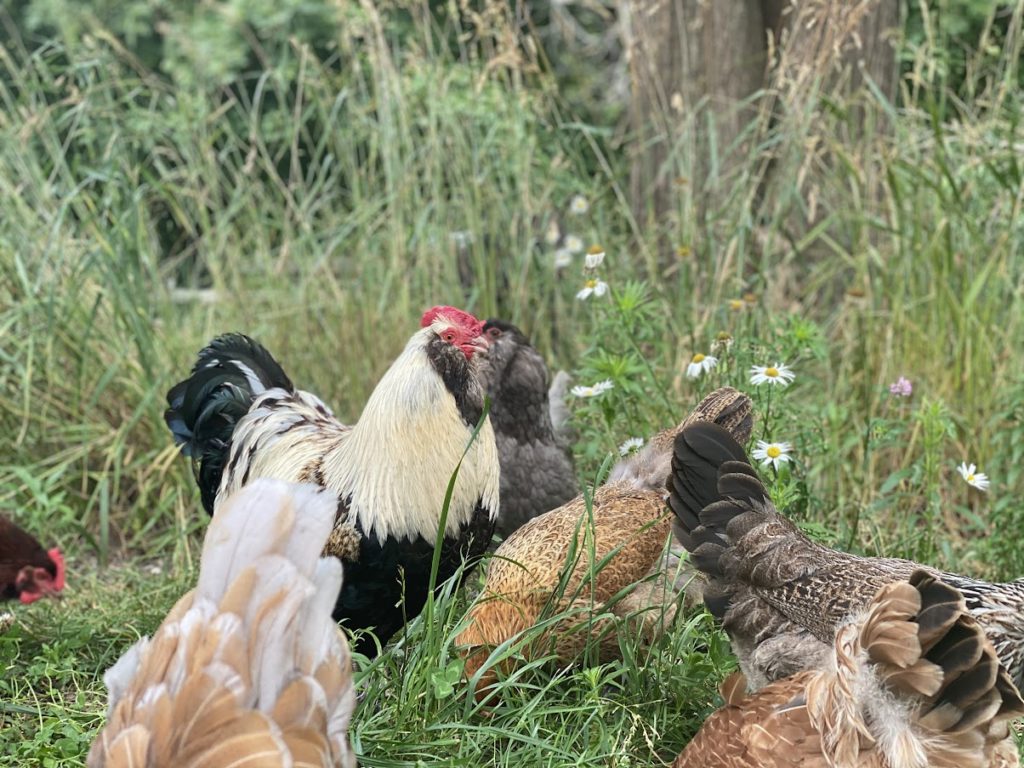
What is free ranging?
Free ranging means very different things to different people. In the commercial chicken farming industry, “free range” chickens are ones that have freedom to move around & have “access to outdoors”. This is certainly better than chickens confined to small battery cages. But in practice, it just means thousands of birds are crammed into a large, enclosed barn. Often the “access to outdoors” means there is a pop door that leads to a small concrete pen that is open for only minutes a day. Most of these chickens are too skeptical of new experiences to ever venture out the door, so they live their entire lives inside the barn.
For backyard chicken keepers, free ranging can also look different from yard to yard. Some chicken owners only allow a supervised free range. They only let their birds out of the run when they are there to supervise. Limited free ranging usually means the chickens are let out to roam for an hour or so. Most times this is done in the early evening, to take advantage of chicken’s natural instinct to return to the coop at dusk. Completely free ranged chickens are allowed full access to the entire yard from dawn to dusk.
Choosing how much, if any, free range time your flock gets is an individual decision. Let’s look at the possible disadvantages and advantages to free ranging your chickens.
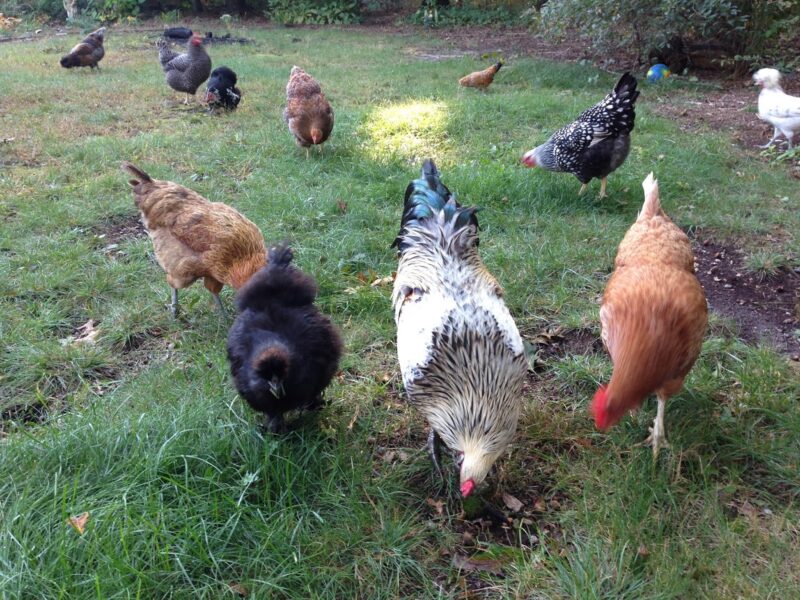
Disadvantages of free ranging
Predators
The most obvious & deadly threat to free range chickens is predators. If your chickens completely free range, you WILL eventually lose some to predators. It is unfortunate, but true. Many people consider their chickens pets, not just livestock, so do not want to take the risk of allowing the birds out of the run.
The night time poses the biggest threat to chickens with raccoons, opossums, weasels, fox, coyotes, bears and more depending on your location. Chickens should ALWAYS be secured in a coop at night to keep them safe. Even during the daylight hours, your flock is not safe. Birds of prey, like hawks & eagles, would love to swoop in and take a chicken (especially chicks or bantam breeds). Neighborhood domestic animals, like dogs or cats, are also a concern during the day.
Poisons
When your chickens are safely secured in their run, you have complete control over their environment. When they are let loose in the world there are a host of poisons they could encounter in a suburban yard. Pest poisons (for rodents or insects), weed killer, or lawn fertilizer could be ingested as the birds forage. Depending on how much they eat, it could kill your bird, or make them very ill. Even worse, traces of the poison could transfer into their eggs, making your family ill.
Laying eggs outside the nest boxes
Do you enjoy a daily Easter egg hunt? If so, this might not be a disadvantage! When chickens free range for much of the day, they could decide to lay their eggs in a number of cozy corners around the yard rather than return to the coop nest boxes.
Chicken poop – everywhere
If your chickens are given unrestricted access to your yard all day long you can expect to find poop everywhere. On your deck. On your lawn chairs. In your garden. All over your welcome mat. On your kid’s swingset. On your grill cover. If they can get to it, they will poop on. No one likes stepping in poop while walking in the yard and you don’t want to track that back into your house. If you want to let your birds free range, I would suggest you section your yard with wire fencing for a chicken area & human area.
Neighborhood dangers
Why would a chicken cross the road? To scratch around your neighbor’s garden. Chickens don’t care about roads or property lines. They could get hit by a car, annoy your neighbors by digging up their plants or pooping on their lawn, or just wander too far from home and get lost (check out my story on Gypsy the Wanderer!)
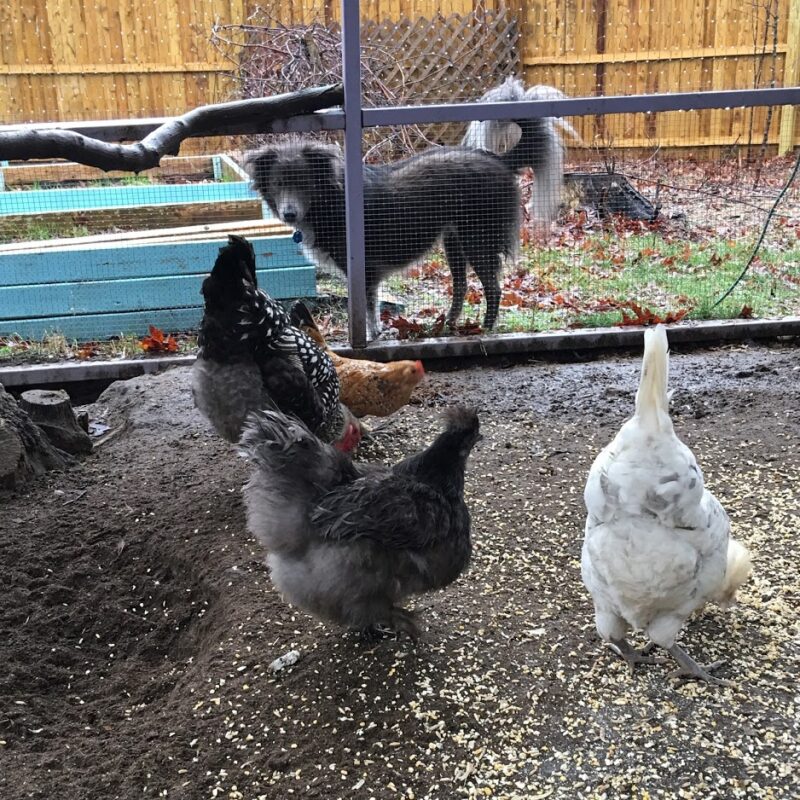
Advantages of free ranging
Less fighting
When your chickens are confined, they get bored. Bored chickens tend to pick on each other. When confined there are only so many places the bullied chicken can run & hide to. You will find free range chickens make for a more harmonious flock.
Less feed
Free range chickens require less feed. While they are out all day browsing on grass, grubs, worms & weeds they are fulfilling a large portion of a healthy, natural diet. While quality feed should always be offered, foraging time will cut down on the amount of feed they will need.
More nutritious & delicious eggs
Pasture raised free range chickens have access to an all you can eat buffet of high protein bugs. Chickens are not meant to be vegetarians. Insects & small rodents are part of their natural diet, as are having access to a variety of different plant materials. What they eat directly effects the quality of their eggs. Pasture raised chickens have flavorful eggs with gorgeous, golden yolks with 1/3 less cholesterol, 1/4 less saturated fat, 2/3 more vitamin A, 2 times more omega-3 fatty acids, 3 times more vitamin E and 7 times more beta carotene! Click here to read more about chicken eggs
Natural insect control
All that bug hunting means less grubs to eat your lawn and less ticks to bite your kids. Win win for everyone!
Less mites & lice
One of the most effective ways chickens combat external parasites is by dust bathing. Yes, you can set up a dust bath in the run, but chickens seem to really enjoy picking out their own locations. Free range chickens also have more space to dust bath so it can truly be the social activity it was meant to be. Click here to read more about dust bathing. Click here to read more about mites & lice
All around healthier & happier chickens
Chickens in even a roomy, confined run have about 10-20 square feet per bird to explore. Free range chickens have an entire yard (even a modest 1/2 acre suburban yard gives them over 20,000 square feet!). All that space to cover gives those little chicken legs a good workout. Chickens that free range are rarely overweight and get plenty of exercise to keep them in great shape. Not only are they healthy, they are happier when allowed to forage. If you don’t believe me, you should hear the protests of my birds on days when I don’t let them out of the run!
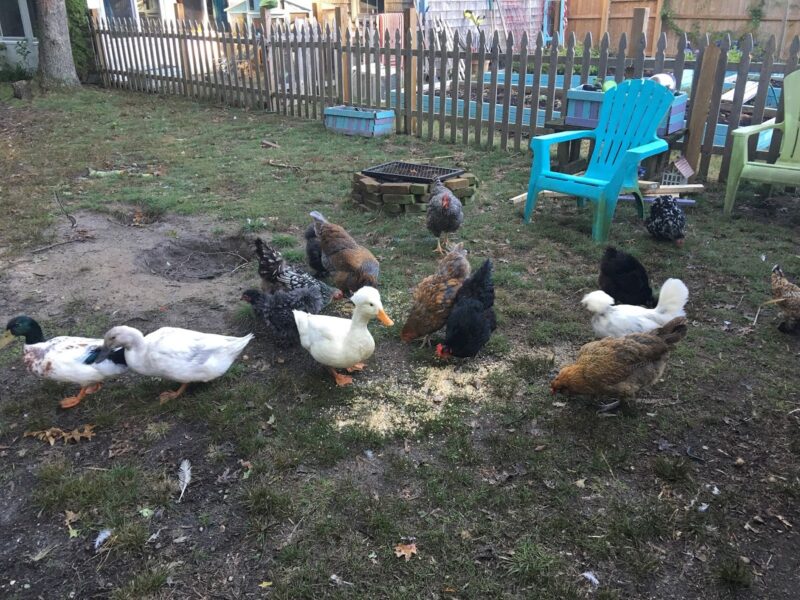
Is free ranging worth it?
This is something each chicken keeper will have to decide for themselves. I personally think the benefits of having happy, healthy hens outweighs the disadvantages, so I let my birds free range all day. We have lost a handful of birds to hawks, it is very sad every time it happens. I am consoled by the knowledge that while they lived, they at least had a very happy, natural life. Luckily, I live in an area where we don’t have large predators like mountain lions or bears, but we certainly have raccoons, opossums, fisher cats, foxes, & a healthy population of hawks.
Steps I have taken to make free ranging safer for my flock
My yard is fenced to help deter (not stop, but at least deter) predators. They are locked securely in their coop at night. There are lots of large bushes & full grown trees they can take cover in during the day. Nearly all of the hens I’ve lost to predators have been bantams so while I love those cute little ones, I have decided to not get any more bantams. The fence keeps the birds from bothering my neighbors or wandering off into the road. I don’t leave out poisons and don’t fertilize my lawn (the chickens do plenty of that on their own!). The addition of a rooster to our flock has really cut down on predator attacks, as he warns the flock to hide and will fight off a predator if needed. I also have alpacas who graze in the same area. The hawks do not like the larger livestock.
I have made my yard as safe as possible, to make free ranging an acceptable risk. My birds go out in the morning as soon as I get up and are out until dusk. They are allowed out year round, although when there is snow on the ground, they tend to stay closer to the barn.
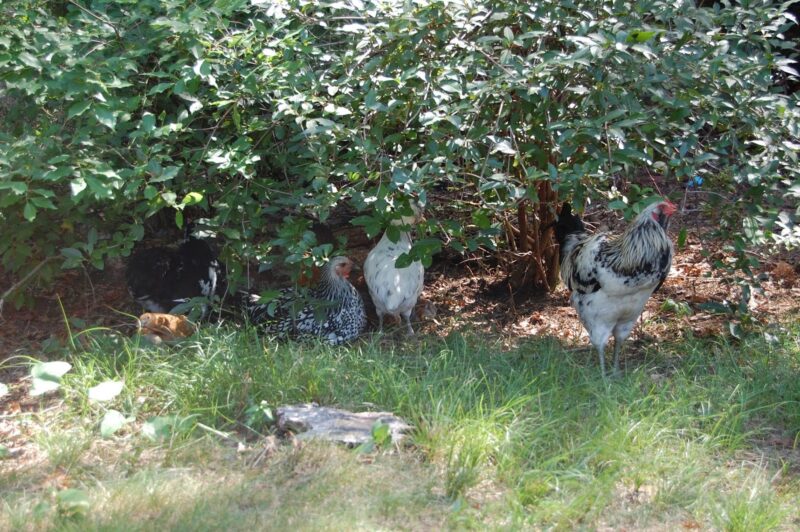


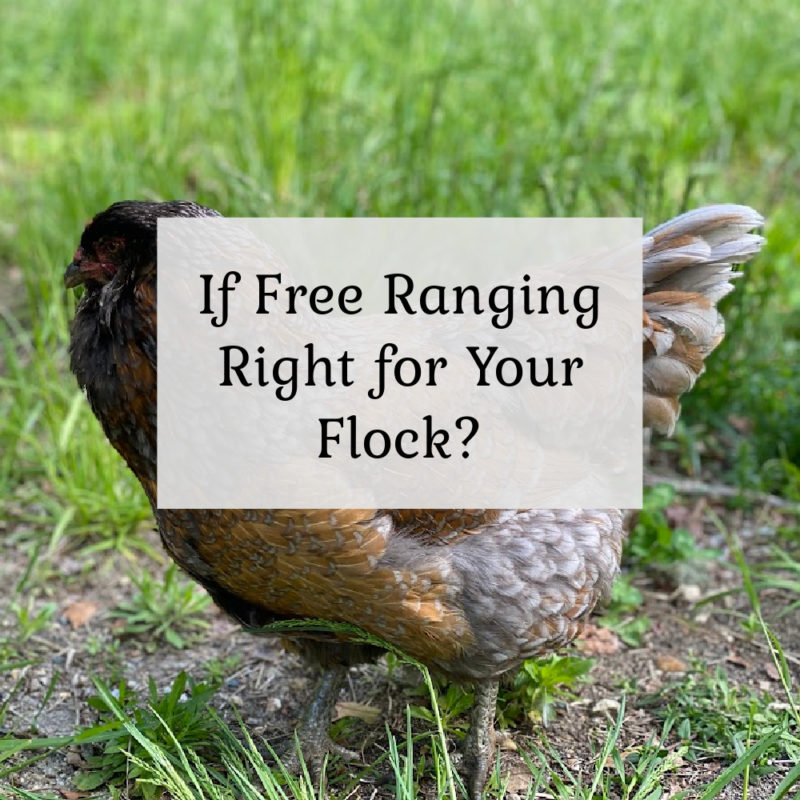


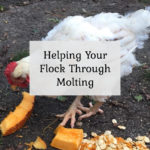

Elina Thampson
Tuesday 28th of December 2021
After Reading your blog I was able to know the other side of free range chickens. Thank you
Nicole
Sunday 14th of March 2021
Hi Liz, I am just starting out with chickens and trying to plan where to let them roam. The place I have decided on has Lillies and daffodils planted. Are those safe? Are there many plants or flowers that are not? Thanks for all of your help and info. It is invaluable 😊
Liz
Monday 15th of March 2021
There are actually a lot of plants that are poisonous to chickens, including lilies and most bulb plants like daffodils. The good news is chickens are pretty smart about what plants they should not be eating. It is wise to move them or fence them off if possible, but if you can't, just keep an eye on them and be ready to move them if you notice some of the leaves or flowers are being eaten. For most plants, a few nibbles will not kill the chickens, they would need to eat a large amount. Rhododendrons are quite poisonous to chickens and I was really worried because when I first got chickens we had a huge one in the yard (we have moved since then). They never tried to eat it, and actually really loved hanging out in the bush, sleeping in the branches during the day. We also had a large amount of day lilies in the area which they also never touched.
Gail
Friday 8th of June 2018
I have allowed my girls free range for eight years and until this year, only lost one girl to a fox because of it. Unfortunately lost another because forgot to close coop door one night. This year, unfortunately, coyotes have taken over and within two weeks, i lost one girl to a hawk and another to a coyote when i was just around the corner of the yard. Now I am leaning toward making a chicken tractor. Breaks my heart because they do love the freedom of wandering everywhere including the wooded areas to dig for worms under the leaves, but now the risk outweighs the benefits with the number of predators right now. Perhaps if it lessens I will allow them to free range in the future.
Liz
Friday 8th of June 2018
That is so sad! It is definitely a risk vs benefit decision. We had a couple month or so period where hawks were picking off our chickens so we kept them in the run for close to 2 months. The hawks moved on and we have been able to let our girls out again.